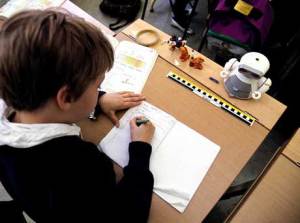 Well it’s that dreaded time of year again when students have to say goodbye to their relaxing summer break and hello to reading books, writing, routines & homework. Ahh….so sad!
Well it’s that dreaded time of year again when students have to say goodbye to their relaxing summer break and hello to reading books, writing, routines & homework. Ahh….so sad!
Luckily there are some students who are very excited about heading back to school, especially to see their friends and use their new supplies. Either way during the long summer break, students often lose much of what they were taught during the school year. A child’s school experience can be a happy one. Teachers and parents play a key role by working as team to support the child. Like the saying goes, “It takes a village to raise a child.” Giving a child endless amount of boring worksheets to work on isn’t the answer. Students need to engage in their learning experience, both hands on and minds on. I understand that parents are busy with work, household chores, etc. so time is important. But, there are simple strategies that parents can do at home to ensure their child’s success in school and in their future. Here are some practical ways to support your child’s learning:
- Encourage your child to read daily. If reading is a problem then encourage him/her to read newspaper articles, magazines or even comic books. Establish a home library.
- Ask who, what, where, when and why questions to extend your child’s thinking skills and knowledge.
- Join and use your public library.
- View and talk about educational television. Encourage your child to ask questions about T.V. programs.
- Watch news on T.V. and discuss daily events.
- Spin a globe and pick a place to research like famous places, location, time, language spoken, and interesting facts.
- Grow a vegetable garden. Then have your child keep an observation book to record what is happening in the garden as it grows.
- Bake a cake from scratch. This allows your child to follow the directions and measure out all of the ingredients.
- Take a trip to a children’s museum, Aquarium, Stanley park, Planetarium, Vancouver Zoo or Science World and talk about what you see.
- Be a tourist for a day and visit historical places of interest in your area.
- Have your child write her/his own book.
- Play games with your child: I Spy, Junior Scrabble, Pictionary, Boggle, card games, Guess Who, Memory etc.
- Register in Parks and Recreation programs.
- Give your child a job at home, for example, set the table, or do the dishes. Encourage your child to stick to jobs at home until completed.
- Check the homework planner daily and check for completion.
- Communicate with your child’s school when you have questions.
Filed under: children, education, learning, school, students, studies, teacher, teaching, Uncategorized | Tagged: back to school, boggle, child, children, education, guess who, homework, i spy, kids, language, learning, library, parents, parents and teachers working together, parents education, pictionary, reading and writing, school, scrabble, student, writing | 2 Comments »

